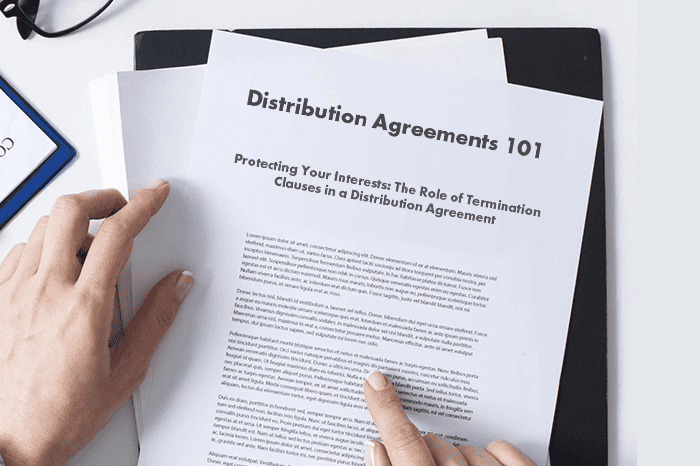Distribution Agreements 101: Termination Clauses and Protecting Interests (Part-3)
Raveena Rani
Raveena is a seasoned International IP Counsel with a unique blend of engineering and legal acumen, specializing in Intellectual Property, Technology Law, and Corporate Transactions. She has extensive experience drafting and negotiating NDAs, commercial agreements, and legal documents in the areas of M&A, SaaS, and AI. Her global perspective is complemented by hands-on internships, corporate counsel roles, and mentoring initiatives. She thrives at the intersection of law, business, and technology.
Need any help? Contact us:

Table of Contents

A distribution agreement’s termination clause is a legal term that specifies the circumstances in which one or both parties may terminate the contract. It is an essential feature of any distribution agreement because it offers a framework for handling problems that can come up as the parties’ relationship develops.
Termination provisions act as a safety net for both the distributor and the supplier. In the event of non-compliance, breach of contract, or other significant infractions, they permit the parties to end the arrangement. For instance, if the distributor doesn’t achieve specific performance standards or distributes the provider’s goods without authorization, the supplier may have the right to end the contract. The supplier’s failure to deliver the agreed-upon level of support, such as marketing and promotional materials, or any other breach of the contract, may also entitle the distributor to terminate the relationship.
Importance of termination clause in a distribution agreement
A termination clause is a vital part of the distribution agreement as it specifies the circumstances in which one or both parties have the right to terminate the contract. This helps offer clarity and direction on how to handle conflicts. Any other issues that may occur during the course of the relationship are also directed via the termination clause. Therefore, it is a crucial instrument for the parties to safeguard their interests.
Oftentimes, a termination clause includes the grounds for the termination of the distribution agreement along with the compensation for unlawful repudiation. The termination clause provides a framework for resolving disputes and problems. Any event of non-performance or contract breaches is regarded to be a reason for contract termination. Therefore, these clauses can also be a basis to resolve disputes. It incentivizes the use of a systematic approach to problem-solving, preventing needless expenses and harm that could come from a court dispute.
A termination clause might also shield the parties from unforeseeable events like natural catastrophes or economic downturns that might harm the agreement. In certain circumstances, the clause may provide the termination of the contract without cause or penalty to either party.
In a distribution agreement, the importance of a carefully written termination clause is exponential. It provides both parties with a certain amount of certainty and predictability and can prevent misunderstandings or incorrect interpretations of the agreement’s provisions. When the need to terminate the agreement arises, the clause provides a safeguard to both the distributor and the supplier.
The role of a termination clause in protecting interests in a distribution agreement
Essentially, the interests of the distributor and the supplier are protected by a termination clause in a distribution agreement. The termination clause explains the circumstances under which one or both parties may end the agreement. It can also be a basis to resolve disagreements or other issues that may develop throughout the partnership.
The termination provision permits the agreement to be terminated in various events like non-performance, violation of contract or any other forms of repudiation. Therefore, it is one of the main means to safeguard the interests of the parties. For instance, the supplier can help the authority to end the contract, if the distributor doesn’t fulfil specified performance goals or distributes its products without authority. Similarly, the distributor also has the entitlement to terminate the contract if the supplier does not provide the assistance that was agreed upon or violates the terms of the agreement for other reasons.
The termination provision can also provide the parties of the contract immunity against unpredictable circumstances. These circumstances might entail natural catastrophes, economic downturns, or other changes in the regulatory environment that may be invoked by legislative amendments. In a few circumstances, the clause may provide the termination of the contract without any cause. This means that termination of the distribution agreement does not always accompany a penalty.
Both parties benefit from the certainty and predictability that the termination clause offers. It can help to prevent misunderstandings or false interpretations of the distribution agreement’s contents. To ensure that the termination clause is appropriately written and reflects the interests and objectives of both parties, it is vital to receive legal counsel.
Conclusion
Finally, a termination clause in a distribution agreement is essential for protecting the supplier and the distributor’s interests. In the event of non-performance, contract breach, or unavoidable circumstances, it can facilitate the termination of the agreement. It is the framework for resolving disputes or other issues that may emerge throughout the relationship.
To make sure the termination clause is appropriately written and reflects the interests and objectives of both parties, it is crucial to receive legal advice from professionals. This can help keep disagreements at bay and guarantee that the parties are safeguarded when an unforeseen circumstance arises
Overall, a well-drafted clause can offer the parties an efficient way to safeguard their interests and address any potential problems that might develop throughout the exchange. Since it is a vital element of any distribution agreement both parties should carefully study it before formally signing the contract.





